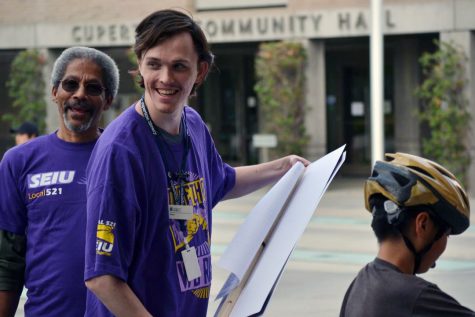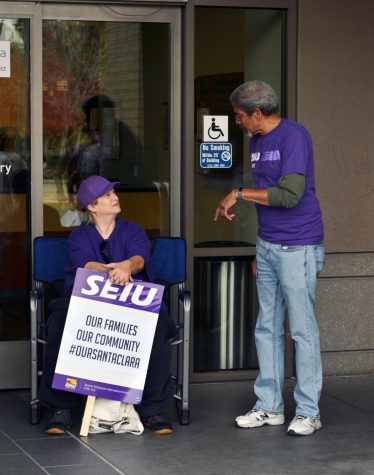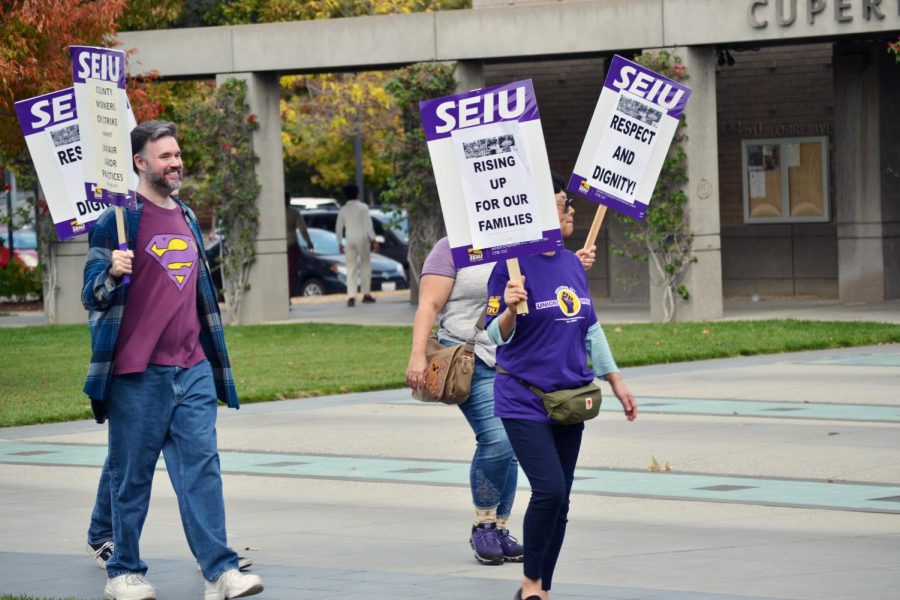Santa Clara County libraries close as county workers strike for fair labor practices
Carrying picket signs and wearing purple shirts that said “Together We Rise,” SEIU-represented workers marched outside the Cupertino library. The strike by over 1,000 public service workers across the county started on Oct. 2 and is expected to continue indefinitely.
October 26, 2019
Marching in front of the Cupertino library Saturday morning and afternoon, library staff and other county workers protested what they allege are unfair labor practices by Santa Clara County, including expired contracts and worker shortages. All seven county libraries closed down services for the day, as part of the first strike by county workers since 1975.
Over 40 people of all ages, some in purple shirts reading “Together We Rise,” carried picket signs and chanted slogans in the Cupertino library plaza.
“I was planning on going to the Cupertino library with a friend to work on a project, but when I arrived, all I found were closed doors and people marching in circles,” Matthew Jin (12) said.
Service Employees International Union (SEIU) Local 521, which represents 12,000 of the county’s 22,000 workers, called the strike on Oct. 2, resulting in full or partial shutdowns of over 20 county agencies. Since the union’s contract with the county expired this June, negotiations for a renewed contract have failed to produce a resolution.
While the union has not publicized details about the contract terms it is requesting, it has filed 15 complaints of unfair labor practices against the county, including high workloads and low employee retention rates. According to flyers handed out by workers at the library protest, over 1 in 7 of the county’s 1,880 budgeted positions remain vacant, leading to understaffing.

Members of the Service Employees International Union Local 521, Santa Clara County’s largest union, gathered outside the Cupertino library to protest what they allege are the county’s unfair labor practices. Libraries across the county shut down today as part of the first county worker strike in 40 years.
“Our goal is to bring attention to the fact that we’ve been working without a contract since June and to show how important county services are,” Cupertino Library assistant and union steward Lucia LeBlanc said in an interview with Harker Aquila. “What we’re asking is that [the county is] able to provide quality services to the communities that we are a part of.”
While libraries reopened Sunday, the strike may continue indefinitely. Thus far, over 1,200 librarians, public defenders, health workers, park rangers, social workers, 911 dispatchers and other employees have participated in the rolling strike, affecting public roads, parks, health centers and social services.
The county has filed its own complaint with the California Public Employment Relations Board, claiming that the strikers have impeded public functions. According to county officials, decreased property tax revenue and a looming recession prevent the county from fulfilling all of the union’s demands.
“Unfortunately [negotiating the contract] is both an objective and a subjective process because [county executives] have to use our best estimate as to whether at the end of the contract or even the middle of the contract four years from now, we’re able to pay these people what we’ve committed to,” county supervisor Dave Cortese said in a phone interview with Harker Aquila.
The county Board of Supervisors and CEO Jeff Smith made their “last, best and final offer” to the union Tuesday night. The offer proposes a cumulative 16 percent general wage increase over the next five years for all SEIU-represented employees, along with a lowered healthcare premium.
SEIU members started voting on the county’s offer yesterday and may take until Nov. 5 to reach a decision. In the meantime, union workers have continued the strike because the offer fails to address their complaints about under-resourced county services, such as a shortage of library workers.
Upper school librarians Amy Pelman and Meredith Cranston described the impact of understaffing on public libraries, which provide community resources like Internet access and job training in addition to books. Pelman works at Burlingame Public Library on weekends and school breaks and belonged to the American Federation of State, County and Municipal Employees Local 829 in the seven years she worked there full-time.
“If you think of all the books that are checking in and out, a lot of that takes manpower,” Pelman said. “The gears come to a halt if you don’t have enough people to do it, so people don’t get the services they need, and they’re also not getting the materials they need. All of those things make it harder and harder for the library to operate.”
Cranston further stressed that libraries play diverse roles in the community, noting the popularity of the upper school library as an example. During Harker Aquila’s interview with Cranston and Pelman, over 70 students used the upper school library to study, and a dozen students came in to use the printer, borrow scissors and get tape.
“[Libraries] are a social resource,” Cranston said. “The impact [of a library closure] is you don’t have access to the physical space and those services that a professional librarian and library staff can provide.”
Despite the inconvenience of the closure, Annie Ma (12) believes the strike will benefit library users in the long run. Annie studies at the Cupertino library nearly every week and enjoys its sense of community.

Protesters sat in front of the Cupertino library, which was closed today and will reopen tomorrow. Library staff and other county workers protested worker shortages, expired contracts and underfunding, among other issues.
“I think that the services of the Cupertino library are valuable to a large amount of people, so the library ought to be sufficiently supported with well-paid and adequate staff,” Annie said.
Workers at other county agencies joined library staff at the Cupertino library protest. Striker Linda Quach, an MRI technologist at Valley Medical Center (VMC) for the past 15 years, said that VMC also suffers from understaffing and a shortage of resources.
“Anytime there’s a major accident, [like a] gunshot or car accident, patients get helicoptered into our hospital. We only have two [MRI] scanners for a county that ranges from Palo Alto all the way to Gilroy,” Quach said in an interview with Harker Aquila. “We want the county to invest in equipment, in resources and in staffing because it ultimately affects the people that we serve.”
Last Thursday, hundreds of employees at VMC and O’Connor Hospital in San Jose stopped work to participate in the strike. As a result, physical and occupational therapy services were canceled for the day, and 30 elective surgeries were rescheduled.
County executives are currently discussing their strategy in case the union rejects their offer. Cortese personally does not agree with the county’s current offer and believes the union will reject it.
“No matter what happens in the future in terms of how this contract is settled, I guarantee that the Board of Supervisors will do a thorough debrief of what went wrong, what went right and what we can do to make sure the things that went wrong don’t happen in the future,” Cortese said.
According to Cortese, the county narrowly avoided a strike in 2011 during the Great Recession. Negotiations with Local 521 that year lasted until 4 a.m. the day before workers intended to strike, but the union ultimately agreed to a contract that would save the county $78.1 million over two years.
While workers accepted the concessions then to prevent the county’s economy from spiraling, they are demanding better terms from the county now.
“The workers themselves are part of the community,” Quach said. “We live in this community. We need to be able to thrive in this community.”


















![“[Building nerf blasters] became this outlet of creativity for me that hasn't been matched by anything else. The process [of] making a build complete to your desire is such a painstakingly difficult process, but I've had to learn from [the skills needed from] soldering to proper painting. There's so many different options for everything, if you think about it, it exists. The best part is [that] if it doesn't exist, you can build it yourself," Ishaan Parate said.](https://harkeraquila.com/wp-content/uploads/2022/08/DSC_8149-900x604.jpg)




![“When I came into high school, I was ready to be a follower. But DECA was a game changer for me. It helped me overcome my fear of public speaking, and it's played such a major role in who I've become today. To be able to successfully lead a chapter of 150 students, an officer team and be one of the upperclassmen I once really admired is something I'm [really] proud of,” Anvitha Tummala ('21) said.](https://harkeraquila.com/wp-content/uploads/2021/07/Screen-Shot-2021-07-25-at-9.50.05-AM-900x594.png)







![“I think getting up in the morning and having a sense of purpose [is exciting]. I think without a certain amount of drive, life is kind of obsolete and mundane, and I think having that every single day is what makes each day unique and kind of makes life exciting,” Neymika Jain (12) said.](https://harkeraquila.com/wp-content/uploads/2017/06/Screen-Shot-2017-06-03-at-4.54.16-PM.png)








![“My slogan is ‘slow feet, don’t eat, and I’m hungry.’ You need to run fast to get where you are–you aren't going to get those championships if you aren't fast,” Angel Cervantes (12) said. “I want to do well in school on my tests and in track and win championships for my team. I live by that, [and] I can do that anywhere: in the classroom or on the field.”](https://harkeraquila.com/wp-content/uploads/2018/06/DSC5146-900x601.jpg)
![“[Volleyball has] taught me how to fall correctly, and another thing it taught is that you don’t have to be the best at something to be good at it. If you just hit the ball in a smart way, then it still scores points and you’re good at it. You could be a background player and still make a much bigger impact on the team than you would think,” Anya Gert (’20) said.](https://harkeraquila.com/wp-content/uploads/2020/06/AnnaGert_JinTuan_HoHPhotoEdited-600x900.jpeg)

![“I'm not nearly there yet, but [my confidence has] definitely been getting better since I was pretty shy and timid coming into Harker my freshman year. I know that there's a lot of people that are really confident in what they do, and I really admire them. Everyone's so driven and that has really pushed me to kind of try to find my own place in high school and be more confident,” Alyssa Huang (’20) said.](https://harkeraquila.com/wp-content/uploads/2020/06/AlyssaHuang_EmilyChen_HoHPhoto-900x749.jpeg)







